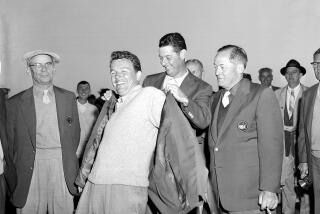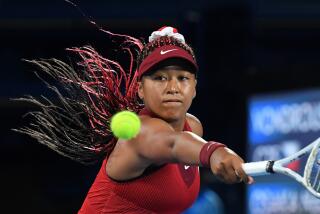Henin’s career never took the conventional approach
Salient reactions to the headline included “Huh?” or “What?” or “Has too much wine affected my eyesight?” Justine Henin retiring at 25? At No. 1 in the world?
No, no, wait, the quirky news gets quirkier, for this tennis wizard went and retired only 11 days from the start of the French Open, an event she rules to such extent that she has won her last 35 consecutive sets toward three straight titles and this very defensible assessment of Roland Garros just last May: “It’s like my garden.”
So to stand there in Belgium, 11 days before the first shoe scrapes across the first red clay in Paris and cite a piddling little months-long slump amid one of the game’s towering careers? To do so at the verge of the event that very plausibly could cure said slump?
On second thought, sure.
It might be a mite eccentric, but then, much of her seven-year fame has ranged from unusual to eccentric.
You start with the phrase “first Belgian to win a Grand Slam singles title,” a set of words unseen upon the earth -- and generally never pondered -- until 2003. Toss in that sort of opaqueness she usually carried around and ask yourself if you can name another No. 1-ranked, often-dominant athlete who is less famous than Henin. Or just start at the beginning.
In a sport of towering women, here came this 5-foot-5 1/2 -inch pipsqueak in the summer of 2001, edging into public consciousness when she derailed Jennifer Capriati’s heady Grand Slam bid in the Wimbledon semifinals and revealing one of humanity’s best-ever answers to that wretched test of hitting a backhand.
So clean was this backhand’s form, so effective its machinations, that it seemed to refute physics, the ball traveling with more zing than her musculature seemed capable of generating. Tennis analysts attempted sonnets. Violin accompaniment didn’t seem far-fetched.
She lost that final to Venus Williams but won just by being there with the flowers at 19, but then, for her first Grand Slam title, Henin cheated. Yep. In a French semifinal in 2003 against Serena Williams, then the defending French champion, Henin trailed 4-2 in the third set before winning 7-5, but also fooled the chair umpire by denying she had just held up her hand to delay Williams’ serve, and denying it because Williams had served a fault. Henin, with the crowd wildly on her side by that point, went on to win the match.
That gave tennis the odd specter of a ruthless pipsqueak, and it matched a frosty countenance with gorgeous shot-making.
She went along, contending from there, delighting purists with her thoughtful attacking, winning the U.S. Open and the Australian Open and the French again in 2005, then somehow transforming women’s tennis into a -- shocker, here -- talk radio topic at the 2006 Australian final. There, she trailed Amelie Mauresmo by 6-1, 2-0 before retiring, prompting a debate about retirement propriety.
So was she ruthless or graceless or even gutless? Well, from that splat, she went on a binge of stoic, barely penetrable excellence, reaching all four Grand Slam finals in 2006, then two finals and one semifinal in the three majors she played in 2007. She fairly towered. She grabbed No. 1 and held on. She fashioned some of the quietest near-dominance ever exacted.
She won everything but Wimbledon, and even that had its quirks. Her 2006 final with Mauresmo ended with Mauresmo’s winning in three tense sets and Henin supplying noticeably few post-match compliments to the champion.
Her 2007 semifinal still defies belief, given that just as she prepared to take the whole dinner set of slams and become a true mastodon, she suddenly lost a 1-6, 7-5, 6-1 puzzler to Marion Bartoli, who was seeded 18th and who credited her turnaround to the inspiring sight of actor Pierce Brosnan in the stands.
“I still don’t really realize what did happen,” Henin said afterward. “I don’t understand what did happen.”
But then, boom, right near the end as it happened, she had flashed a burst of open humanity. In a sport fraught with family members latching on, always visible in the stands, Henin’s case always qualified as eccentric in that her three siblings didn’t appear because she was estranged from them. But when her brother David suffered a scary automobile accident in April 2007, and Justine materialized at his bedside, soon all three siblings materialized at Roland Garros, and Henin spoke freely and willingly about the happy stresses of post-estrangement.
She thanked them in her on-court speech, and they felt moved. We’re just getting to know her, now she leaves.
OK.
She leaves behind a game of tall people pounding balls like clockwork from baselines, and her departure robs the sport of some of the strategic contrast for which it aches. Heck, she leaves just at the moment when her career endurance might have started to fuel her public appreciation. She leaves ranked No. 1, something completely unforeseen because nobody had ever seen it.
It just doesn’t figure except that, I guess, it figures.
More to Read
Go beyond the scoreboard
Get the latest on L.A.'s teams in the daily Sports Report newsletter.
You may occasionally receive promotional content from the Los Angeles Times.










